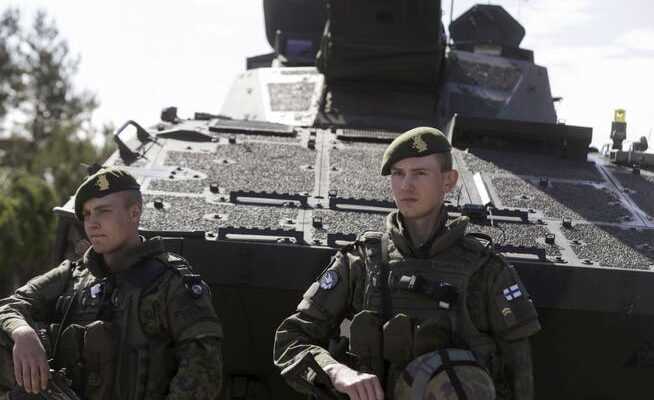Finland’s head of state has for the first time taken a clear position on the question of joining NATO and supports the immediate submission of a corresponding application. The political process for this is likely to proceed quickly and draw neighboring Sweden with it.
Finnish soldiers during the NATO maneuver Saber Strike in Latvia in a picture from 2015. Previously a non-aligned country with close ties to NATO, Finland is now about to submit an application for membership.
In a joint statement Finland’s President Sauli Niinistö and Prime Minister Sanna Marin have theirs on Thursday Support for Finland’s bid to join NATO reaffirmed. It was the first time that the country’s two highest political officials had spoken out on the issue. They had previously argued that they did not want to prejudice the debate on security policy, which had been running hot for three months, by publishing their own positions.
This discussion was important, underlined Marin and Niinistö in their statement, and they wanted to give it the space it needed. But now it is time to make a decision. Accession to the North Atlantic Pact is likely to strengthen both Finland’s security and the security of NATO as a whole. An application for membership should therefore be submitted immediately.
Broad consensus after a spectacular turnaround
Although this step has to be decided by parliament, the joint position of Marin and Niinistös is tantamount to a definitive yes. All the more so since they have their political home in the country’s two largest parliamentary formations: Marin in the Social Democratic Party, Niinistö in the liberal-conservative National Coalition Party. That alone is a measure of the breadth with which the spectacular security policy change of direction in the hitherto non-aligned country is supported.
The yes to NATO from the highest level comes as no surprise, although a majority in Finland could not have imagined taking this step six months ago. The most recent opinion poll spoke of a record high 76 percent in favor – in January it was only 30 percent. In the parliamentary parties, too, approval ranges from the far left to the far right.
The Left Alliance had the hardest time with the question. Its leader, Li Andersson, who serves as education minister in Sanna Marin’s centre-left cabinet, however, declared a few days ago, if the government recommends NATO membership to parliament, that is no reason for her party to leave the coalition. For a long time, there was agreement within the party that Finland must maintain freedom of alliance, but opinions on this are now divided.
«Russia, look in the mirror»
Sweden and Finland signed security declarations with the United Kingdom on Wednesday as part of British Prime Minister Boris Johnson’s tour of northern Europe. Even if these are bilateral acts, both Nordic countries see this as an important sign of NATO’s willingness to provide security guarantees for the time while the accession process is still ongoing. Because accession candidates are not yet formally protected by NATO article five, which stipulates the mutual obligation to provide assistance.
In a joint media appearance with Johnson, President Niinistö described the signing of the safety declaration as a big step forward. He attracted attention with an unusually direct statement to Moscow, given the reserved style he usually cultivated.
Sweden and Finland have pursued their previous policy of non-alignment of their own free will, said Niinistö. Due to Moscow’s recent behavior, however, one had to think about it. “Should we join NATO?” said Niinistö, «Then my message to Russia is: you caused it. Look in the mirror.”
Niinistö’s words are all the more remarkable as he is one of the few Western politicians who had really good ties, perhaps even a friendly relationship, with Russian President Putin. The two had met often and had many open discussions.
Historical turning points and Finnish pragmatism
While Russia’s military attack on Ukraine is the direct reason why Finland is abandoning the path of freedom of alliances it has been pursuing for decades, Finnish history professor Henrik Meinander sees NATO accession as the culmination of a longer process. It is undoubtedly a historic moment, comparable to the accession to the EU in 1995 and the end of the era of “Finlandization” with the collapse of the Soviet Union in 1991.
With the lapse of the Soviet-Finnish treaty of 1948, which gave Moscow direct influence on Finnish security policy, Helsinki has regained the ability to act in foreign policy, said Meinander. Even joining the EU was more for security than economic reasons, even if it was never made public.
If the accession to NATO now takes place in a hurry against the background of Russia’s war in Ukraine, there is a historical parallel: action was taken quickly in Helsinki as early as 1917, when the collapse of the tsarist empire suddenly presented the opportunity for an independent establish a Finnish state.
According to Finnish Parliament Speaker Matti Vanhanen, the chamber will meet on Monday to consider the government’s proposal to submit a NATO membership bid. Similar decisions are also pending in Sweden over the weekend, but for the time being only at party political level. Finland’s now clearly communicated position will undoubtedly have an impact said Swedish Foreign Minister Ann Linde on Thursday. The possibility that both countries could submit an official application for membership at the same time as early as next week is still in play.
